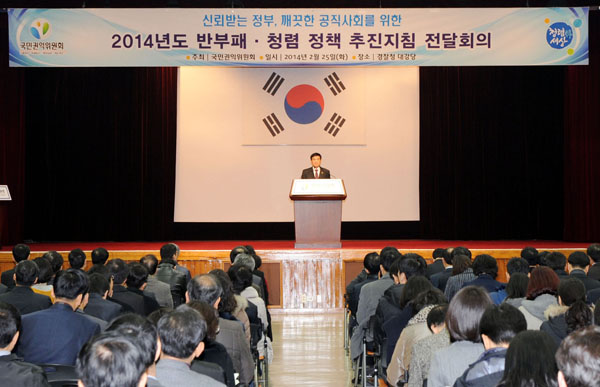Cracking down on "3 major corrupt practices" in public sector
- Date2014-05-12
- Hit4,760

The ACRC selected corruption causing the loss of national finance, lenient punishment against corrupt officials, and lax management of public organizations as 3 major corrupt practices in the public sector on which it will focus its anti-corruption efforts this year.
On February 25, the ACRC held the "2014 Anti-Corruption Policy Briefing Meeting" at the auditorium of the National Police Agency, which brought together inspection officials from 1,174 public organizations, including central government agencies, local governments, education offices, and public service-related organizations. At the meeting, the Commission presented policy guidelines for this year to deal with the 3 major corrupt practices, and asked for active cooperation of public organizations in implementing these guidelines.
According to the guidelines, the ACRC is planning to tighten control over the leakage of welfare budgets through the Government Welfare Fraud Report Center (110) that it launched in October last year. It will also draft a bill to legislate a comprehensive system to monitor false and illegal claims for public money and recover ill-gotten gains from such claims.
It also plans to improve the disciplinary systems of public service-related organizations to make them as stringent as those applied to public servants, and to inspect whether these systems operate properly.
Moreover, the ACRC will focus on inspecting the practices of lax management of public organizations, including preferential recruitment of families and relatives, improper awarding of contracts to retired employees and excessive benefits for employees. To fundamentally resolve the problems, it will conduct the Corruption Impact Assessment and other measures to improve relevant laws and institutions. It will also create new specialized indexes regarding lax management when conducting the Integrity Assessment for public organizations, disclosing the assessment results at the end of the year.
ACRC Chairman Lee Sungbo requested that "To 'normalize the abnormal practices' in our society, each organization has to recognize that the public sector should set an example by eliminating such chronic corrupt practices, and devote itself to preventing even trivial acts of corruption."









